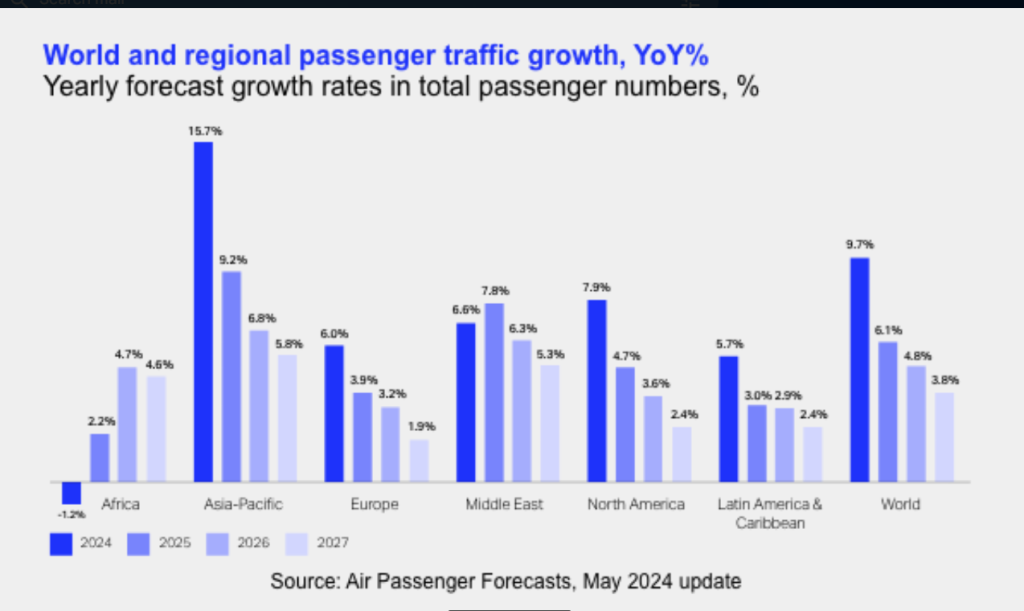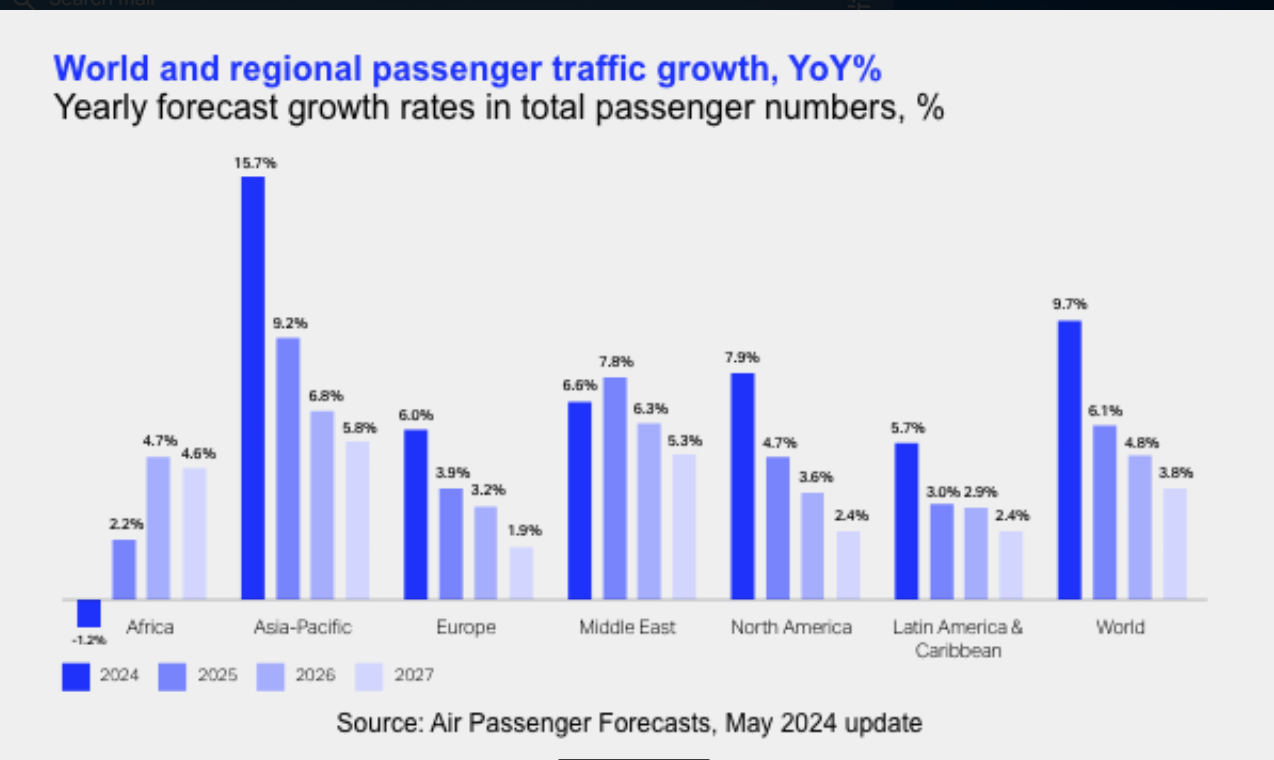
The aviation industry is poised for substantial growth, with global passenger numbers expected to surge by 9.7% in 2024. However, this growth is unevenly distributed, with the Asia Pacific region leading the way at 15.7% due to a lower base and rising living standards. Europe and North America are also set for robust growth, while Africa may face a slight contraction attributed to economic slowdowns in Northern Africa. Forecasts suggest that the number of air passengers will double by 2043, with an average annual growth rate of 3.6%. Emerging markets, particularly in Asia Pacific and the Middle East, are anticipated to drive this expansion, while mature markets like Europe and North America will experience more moderate increases. Nevertheless, this optimistic forecast carries risks, including geopolitical tensions, economic slowdowns, and rising energy prices. In this challenging landscape, African airlines must adopt innovative strategies to remain profitable and competitive.
1. Strengthening Regional Connectivity
African airlines should focus on improving regional connectivity to tap into the potential of intra-African travel. By enhancing flight frequencies and routes within the continent, airlines can stimulate demand for regional travel, making it easier for passengers to travel between African countries. This approach can help mitigate the impact of economic slowdowns in specific regions by diversifying revenue sources and spreading risk across multiple markets.
2. Leveraging Strategic Partnerships and Alliances
Forming strategic partnerships and alliances with other airlines can provide African carriers with access to broader networks and resources. Code-sharing agreements and joint ventures with international airlines can enhance connectivity and offer passengers more travel options. Additionally, partnerships can help African airlines reduce operational costs through shared services and joint procurement.
3. Embracing Digital Transformation
Investing in digital technologies can significantly enhance operational efficiency and customer experience. African airlines should prioritize the adoption of advanced booking systems, mobile apps, and digital payment solutions to streamline the travel process. Moreover, utilizing data analytics can provide valuable insights into passenger preferences and behavior, enabling airlines to tailor their services and marketing efforts effectively.
4. Optimizing Fleet Management
Efficient fleet management is crucial for maintaining profitability in a competitive market. African airlines should focus on modernizing their fleets with fuel-efficient aircraft to reduce operational costs and improve environmental sustainability. Additionally, flexible leasing arrangements can provide airlines with the agility to adjust their capacity in response to fluctuating demand.
5. Enhancing Customer Experience
Providing exceptional customer service can differentiate African airlines from their competitors and foster passenger loyalty. Airlines should invest in staff training, onboard amenities, and loyalty programs to enhance the overall travel experience. Personalized services, such as tailored in-flight entertainment and meal options, can also contribute to higher customer satisfaction.
6. Navigating Regulatory Challenges
Understanding and navigating the complex regulatory environment is essential for African airlines to operate smoothly. Airlines should engage with regulatory bodies to advocate for policies that support the growth of the aviation industry. Additionally, compliance with international safety and security standards is crucial for maintaining passenger confidence and attracting international travelers.
7. Exploring Ancillary Revenue Streams
Diversifying revenue sources beyond ticket sales can help African airlines boost profitability. Ancillary services such as baggage fees, onboard sales, and premium seating options can generate additional income. Additionally, offering travel-related services such as hotel bookings, car rentals, and travel insurance can create new revenue streams and enhance the overall travel experience for passengers.
8. Focus on Sustainability
Sustainability is becoming increasingly important in the aviation industry. African airlines should prioritize environmentally friendly practices, such as reducing carbon emissions and minimizing waste. Investing in sustainable aviation fuels and exploring carbon offset programs can help airlines meet environmental regulations and appeal to eco-conscious travelers.
9. Building Resilience to Economic Shocks
Given the potential risks of economic slowdowns and rising energy prices, African airlines must build resilience to withstand market fluctuations. This includes maintaining healthy cash reserves, diversifying revenue sources, and implementing cost-control measures. Scenario planning and risk management strategies can also help airlines prepare for and respond to unforeseen challenges.
Conclusion
While the forecast for global aviation growth presents significant opportunities, African airlines must navigate a unique set of challenges to remain profitable. By focusing on regional connectivity, strategic partnerships, digital transformation, fleet optimization, customer experience, regulatory compliance, ancillary revenue, sustainability, and economic resilience, African airlines can position themselves for success in an evolving industry landscape. Proactive and innovative approaches will be essential for African carriers to thrive amid global aviation growth and ensure long-term profitability.




0 Comments